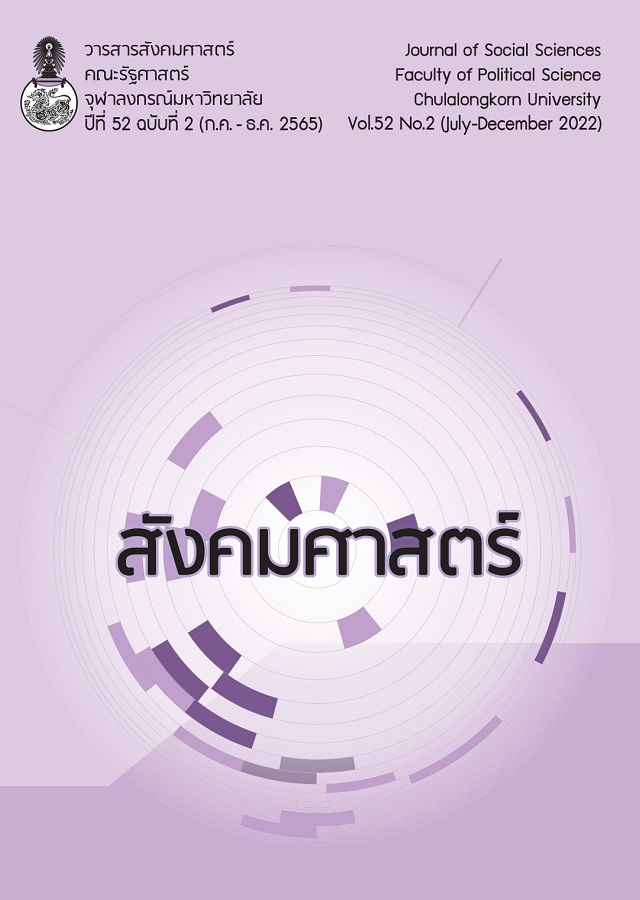Online Echo Chamber and First-Time Voters in the 2019 Thai General Election
DOI:
https://doi.org/10.61462/cujss.v52i2.897Keywords:
echo chamber, filter bubbles, social media, political participation, first-time voters, big data, 2019 Thai General ElectionAbstract
The research objectives are as follows: 1) to explore echo chamber effects on first-time voters’ online political communication during the 2019 General Election, 2) to study the relationship between online echo chamber and political attitudes, and 3) analyze contributory factors to the phenomenon of echo chambers. Mixed methods are employed. The findings are that certain ideas and sets of information have been reinforced and disseminated widely through reproduction and support in polarized groups. Some methods yield findings suggesting the “filter bubbles” phenomenon or algorithmic filtering based on user preferences. Furthermore, the presence of echo chamber condition is found to have statistically significant relationship to users’ political attitudes, resulting in the creation of “thought landscape” surrounding each individual. These elements together with the technological factors and social group formation have direct bearings on the creation of “terrains of thoughts” which is a pre-condition for echo chamber phenomenon. In addition, the following factors are found to directly contribute to the formation of echo chambers: 1) the algorithmic filtering which creates the filter bubbles, 2) users’ exposure to political news and information, 3) political attitudes and the related political context, and 4) social networks and political participation as manifested in social media.
Downloads
References
Festinger, Leon. 1957. A Theory of Cognitive Dissonance. Stanford, CA: Stanford University Press.
Garett, R. Kelly. 2009. “Echo Chambers Online?: Politically Motivated Selective Exposure among Internet News Users.” Journal of Computer-Mediated Communication 14(2): 265-285. Accessed June 28, 2020. https://onlinelibrary.wiley.com/ doi/full/10.1111/j.1083-6101.2009.01440.x.
Iyengar, Shanto, and Kyu S. Hahn. 2009. “Red Media, Blue Media: Evidence of Ideological Selectivity in Media Use.” Journal of communication 59(2009): 19-39. Accessed June 28, 2020. https://www.semanticscholar.org/paper/Red-Media%2C-Blue-Media%3A-Evidence-of-Ideological-in-Iyengar-Hahn/a2953df9760d1aaadeb3c094109785947b05c1dd.
Loader, Brian D., Ariadne Vromen, and Michael A. Xenos. 2014. “The Networked Young Citizen: Social Media, Political Participation and Civic Engagement.” Information, Communication and Society 17(2): 143-150. Accessed June 28, 2019. https://www.researchgate.net/publication/263404850_The_networked_young_citizen_social_media_political_participation_and_civic_engagement_INTRODUCTION.
Matichon Online. 2018. “Siang Run Mai Thi ‘Yang Mai Khoei Lueaktang’ Mi Kwa 5 Lan Khon.” [Voices of the New Generation of More Than 5 Million First Time Voters]. Accessed June 28, 2019. https://www.matichon.co.th/politics/ news_941410. (in Thai)
Munson, Sean A., and Paul Resnick. 2010. “Presenting Diverse Political Opinions: How and How Much.” In Proceedings of the SIGCHI Conference on Human Factors in Computing Systems, 1457-1466. New York, NY: Association for Computing Machinery. Accessed June 28, 2020. https://www.semanticscholar.org/paper/Presenting-diverse-political-opinions%3 A-how-and-how-Munson-Resnick/1dc923d5bade0578def7d32faf043cf43d562915.
Pariser, Eli. 2011. The Filter Bubble: What the Internet Is Hiding from You. New York, NY: Penguin Press.
Robson, David. 2018. “The Myth of the Online Echo Chamber.” Accessed June 28, 2019. https://www.bbc.com/future/ article/20180416-the-myth-of-the-online-echo-chamber.
The Standard Team. 2018. “Khon Thai Chai Net 10 Chuamong To Wan Mak Kwa Pi Kon Kueap 4 Chuamong Len Social Media Chalia Wan La 3 Chuamong Khrueng.” [Thais Spend 10 Hours a Day Surfing the Net, Almost 4 Hours More Than Last Year; Using Social Media 3.5 Hours a Day]. Accessed June 28, 2019. https://thestandard.co/thai-internet-user-behavior. (in Thai)
Stroud, Natatie Jomini. 2017. “Selective Exposure Theories.” In The Oxford Handbook of Political Communication, edited by Kate Kenski and Kathleen Hall Jamieson, 531-548. Oxford: Oxford University Press. Accessed June 28, 2019. https://books.google.co.th/books/about/The_Oxford_Handbook_of_Political_Communi.html?id=DPUtDwAAQBAJ& printsec=frontcover&source=kp_read_button&redir_esc=y#v=onepage&q&f=false.
Sunstein, Cass R. 2007. Republic.com 2.0. Princeton, NJ: Princeton University Press.
Van Alstyne, Marshall and Erik Brynjolfsson. 1997. “Electronic Communities: Global Village or Cyberbalkans?” Economic Theory (April): 1-32. Accessed June 28, 2020. https://www.researchgate.net/publication/228680561_Electronic_ communities_Global_village_or_cyberbalkans.
Downloads
Published
How to Cite
Issue
Section
License
Copyright (c) 2022 Faculty of Political Science, Chulalongkorn University

This work is licensed under a Creative Commons Attribution-NonCommercial-NoDerivatives 4.0 International License.
Public Licensing Terms
Copyright and Licensing Policy
The Chulalongkorn University Journal of Social Science publishes all content under the Creative Commons Attribution-NonCommercial-NoDerivatives 4.0 International License (CC BY-NC-ND 4.0).
Copyright
All published articles in the Chulalongkorn University Journal of Social Science are the copyright of the Faculty of Political Science, Chulalongkorn University. Authors transfer all rights to the journal upon acceptance of their manuscript for publication.
CC BY-NC-ND 4.0 License
Under this license:
-
Attribution (BY): Users must give appropriate credit to the authors, the Faculty of Political Science, Chulalongkorn University, and the Chulalongkorn University Journal of Social Science, provide a link to the license, and indicate if changes were made. They may do so in any reasonable manner, but not in any way that suggests the licensor endorses them or their use.
-
NonCommercial (NC): Users may not use the material for commercial purposes. Commercial use requires prior written permission from both the authors and the Faculty of Political Science, Chulalongkorn University.
-
NoDerivatives (ND): If users remix, transform, or build upon the material, they may not distribute the modified material. Adaptations of the work require prior written permission from both the authors and the Faculty of Political Science, Chulalongkorn University.
Open Access Statement
The Chulalongkorn University Journal of Social Science provides immediate open access to its content on the principle that making research freely available to the public supports a greater global exchange of knowledge. Users are allowed to read, download, copy, distribute, print, search, or link to the full texts of the articles without asking prior permission from the publisher or the author, in accordance with the CC BY-NC-ND 4.0 license.
Self-Archiving Policy
Authors may archive the final published version, preprints, or postprints of their articles in institutional repositories or on their personal websites, provided that they acknowledge the original publication in the Chulalongkorn University Journal of Social Science with a complete citation and a link to the journal's website.
Permissions
For any use beyond those covered by the CC BY-NC-ND 4.0 license, please contact:
Editorial Office
Chulalongkorn University Journal of Social Science
Faculty of Political Science, Chulalongkorn University
Email: cusocscij@gmail.com
For more information about the Creative Commons Attribution-NonCommercial-NoDerivatives 4.0 International License, please visit: https://creativecommons.org/licenses/by-nc-nd/4.0/





